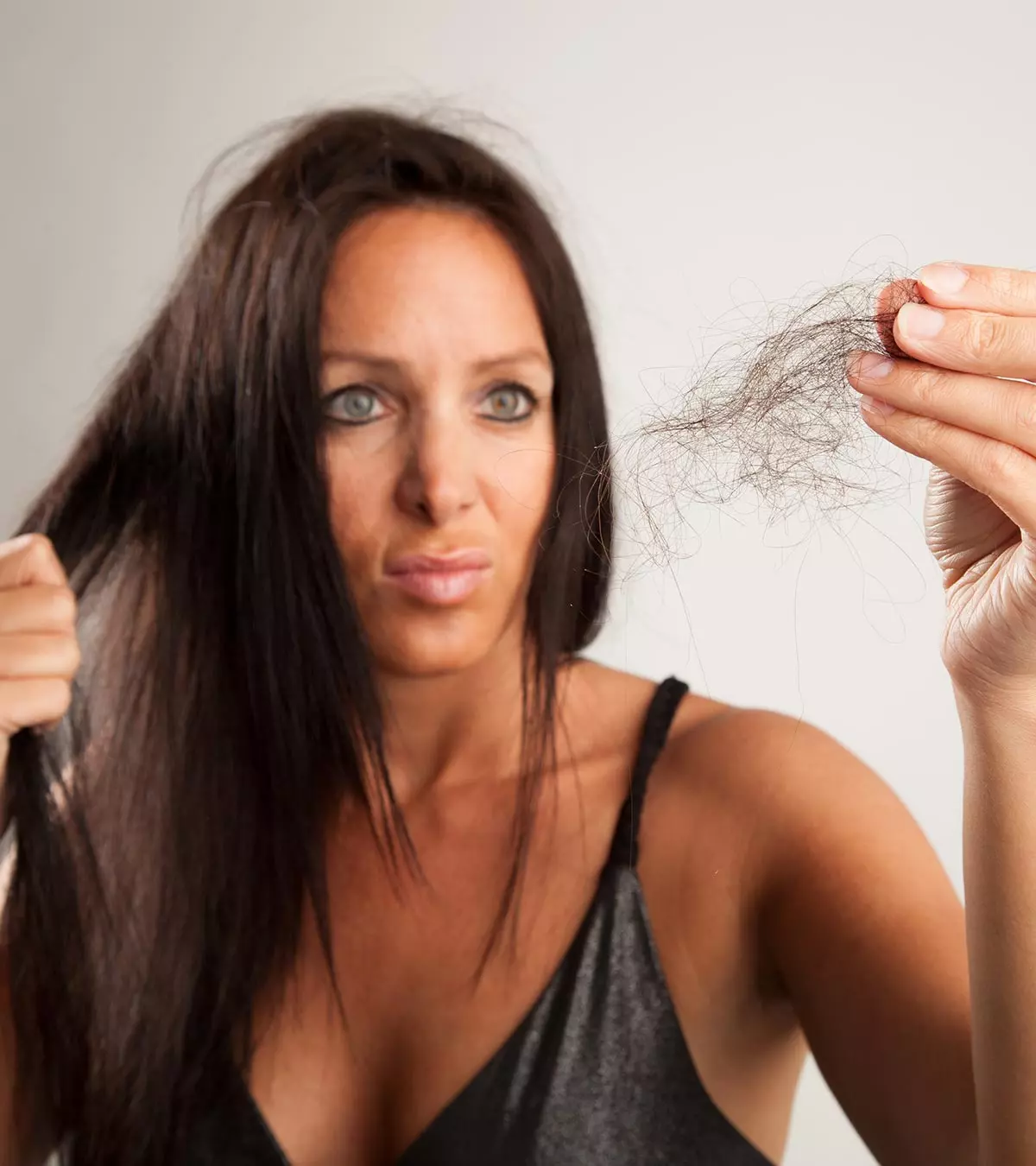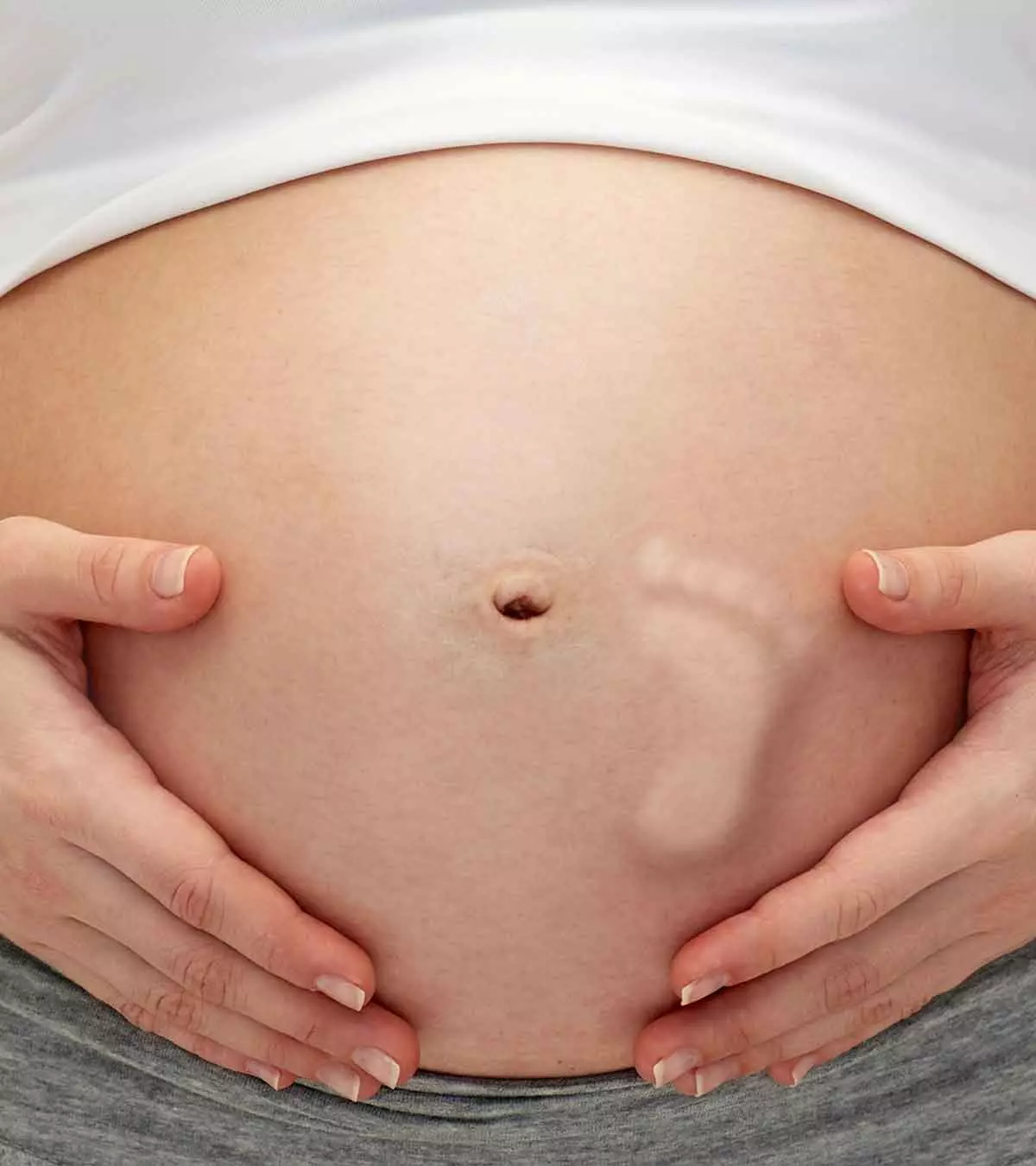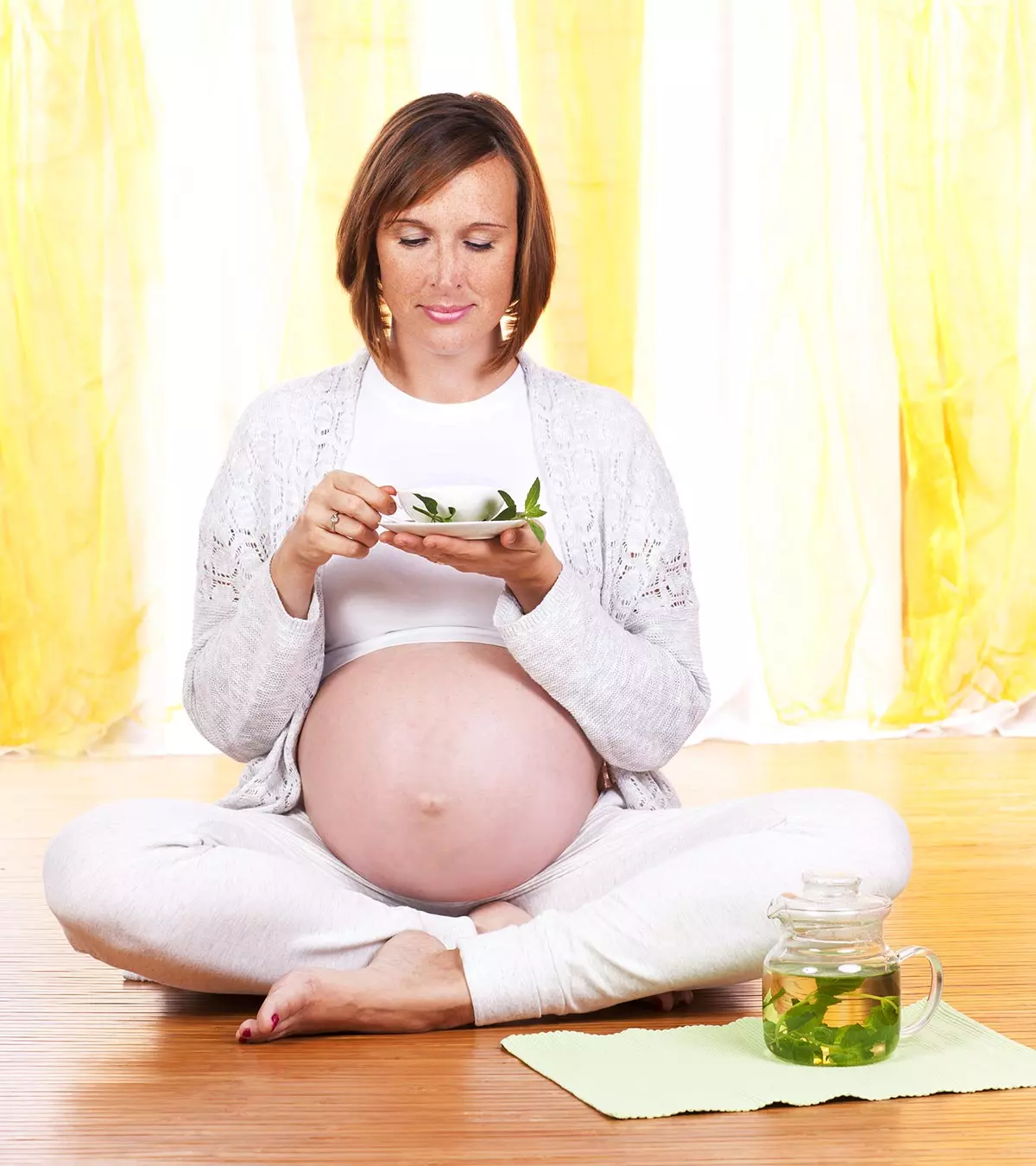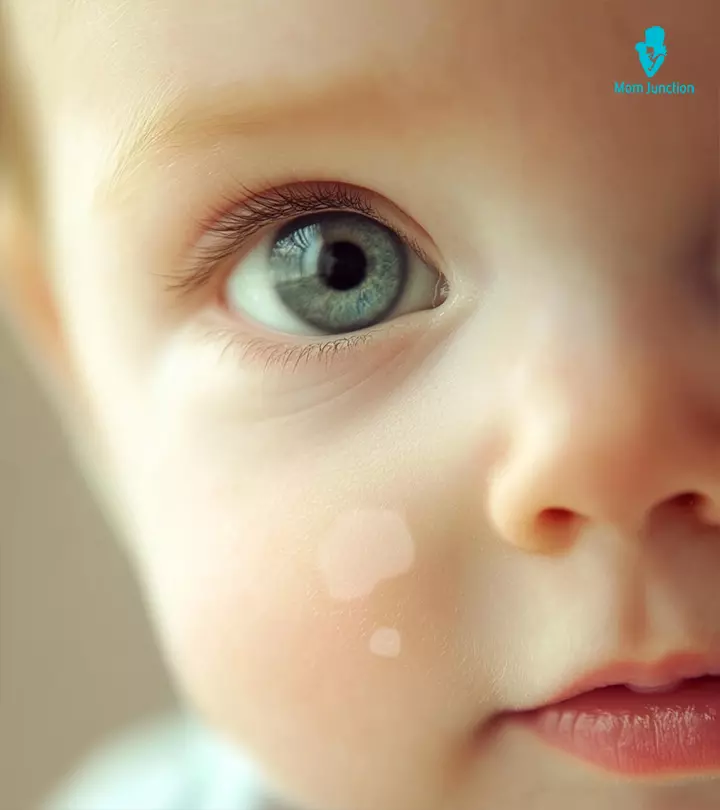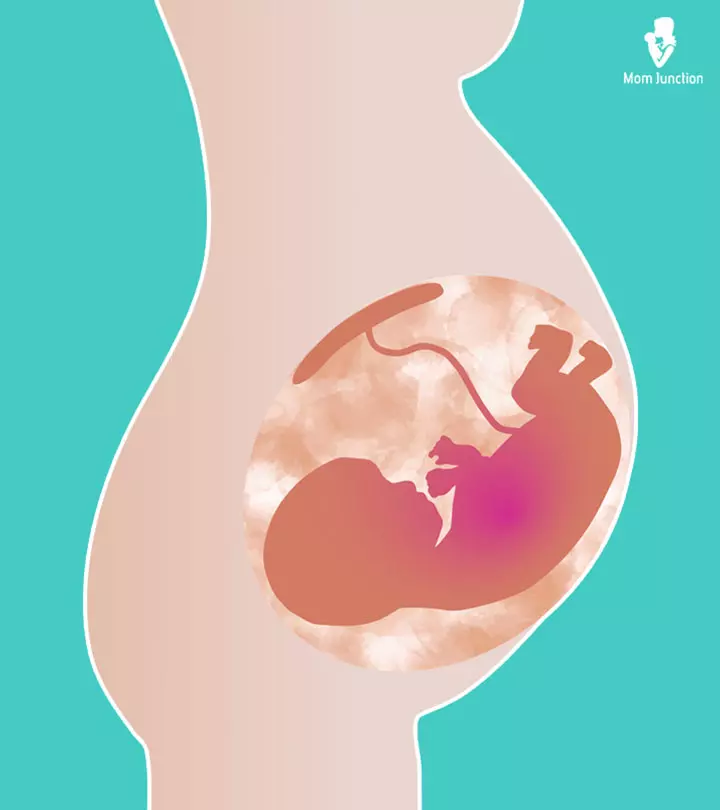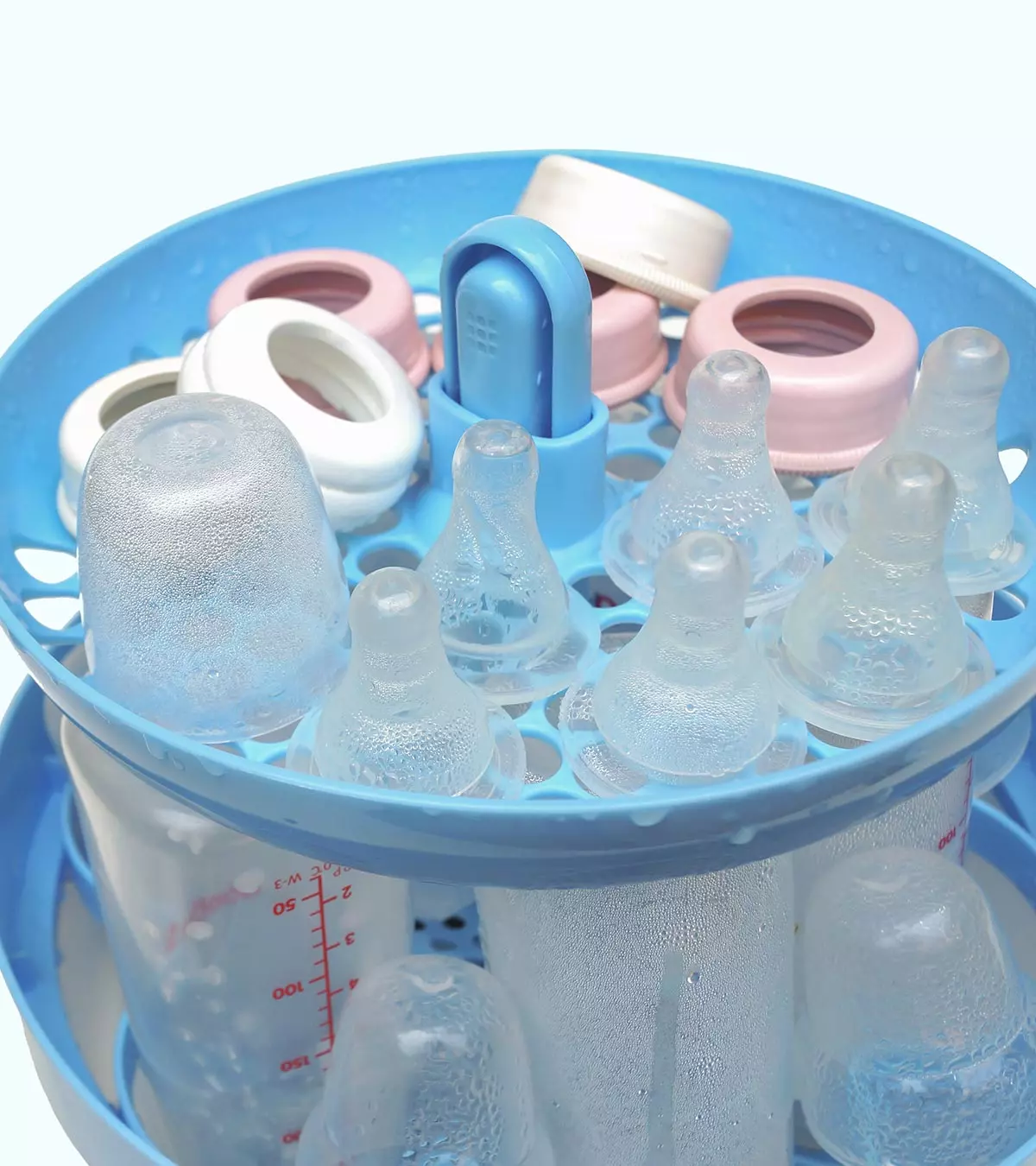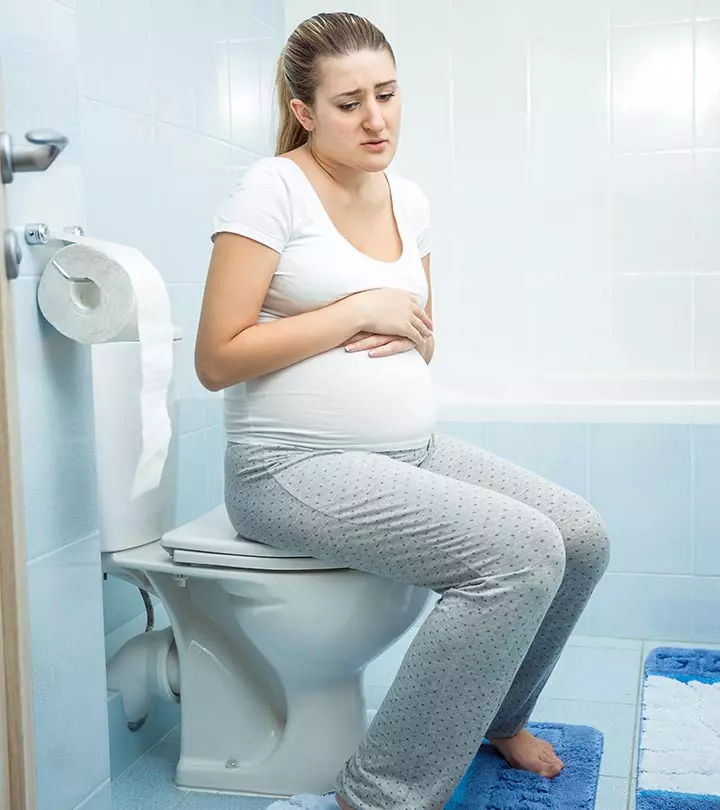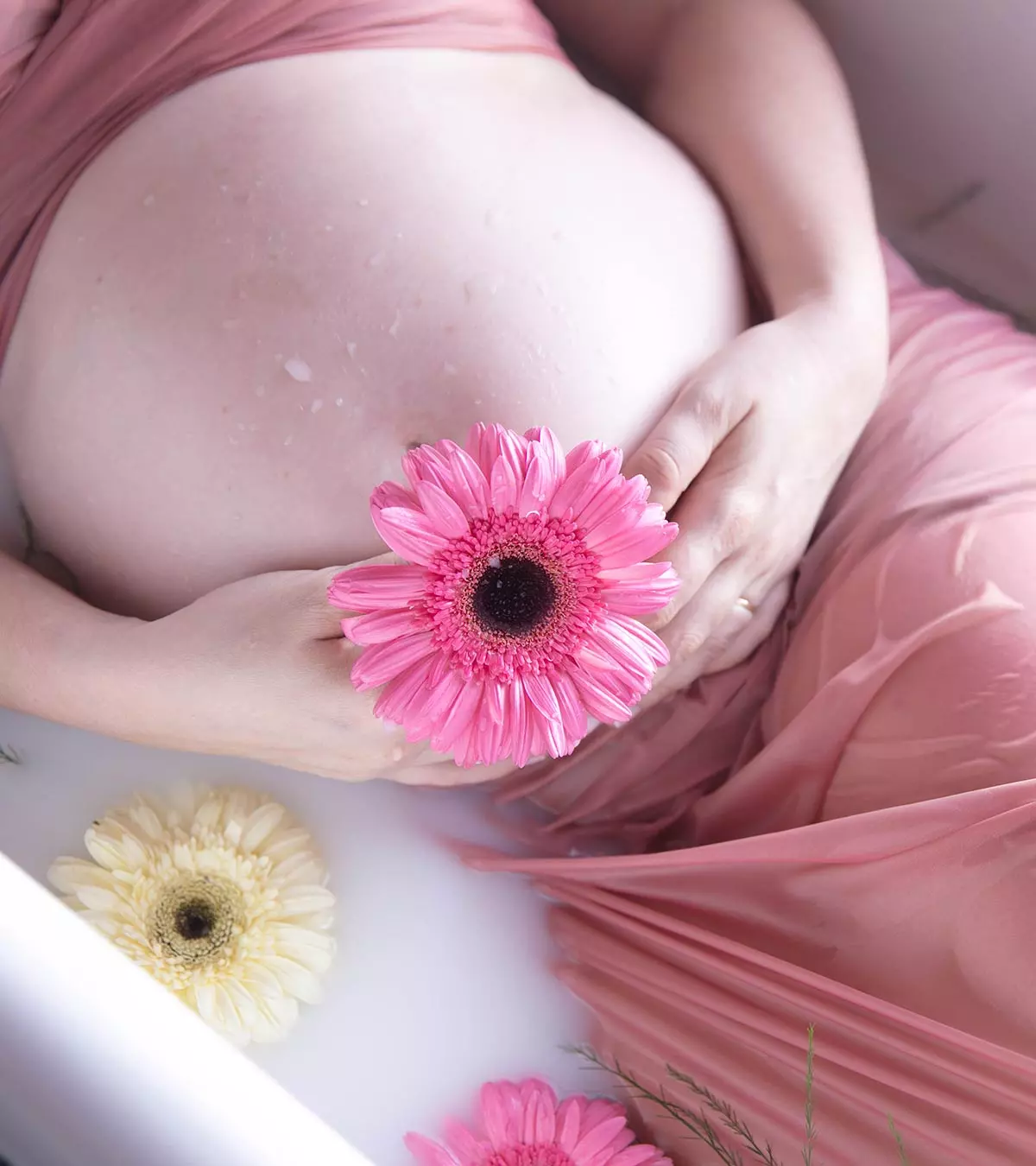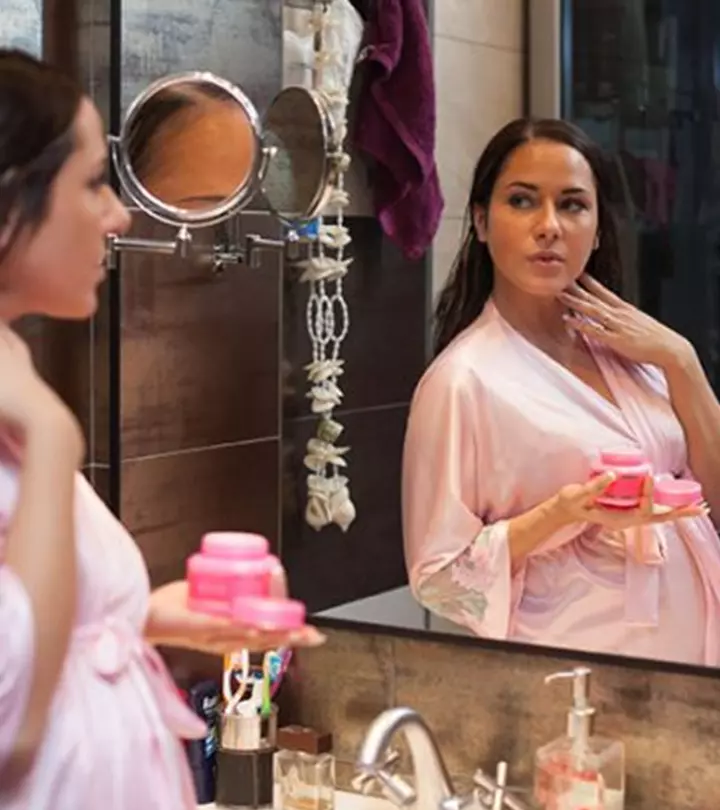
Image: ShutterStock
As you get a positive pregnancy test, you find yourself checking on the toxicity and safety aspects of all the elements surrounding you. One such thing that could add to your apprehensions is using make-up during pregnancy. If you are someone who loves applying cosmetic and other make-up products, you may have to rethink before continuing its use while pregnant. Reportedly, certain toxic chemicals can pose risks to the cognitive development of the fetus (1). Want to know more about the possible risks and safety aspects of using make-up while expecting? Keep reading as we discuss all this and more about wearing make-up when pregnant.

Jen, a mother and a beauty blogger, shares her experience with makeup during her pregnancy on her blog. She says, “While I still wear makeup regularly, I’ve found that my consumption of new makeup has decreased notably. One notable exception is that Springtime has revived my love of fresh, vibrant, dewy cheek and lip color. I’ve been easily able to satisfy these cravings via some beautiful natural makeup brands like Rituel de Fille, Kosas, and Lilah B. Holt Renfrew has just launched an amazing collection of clean beauty brands, and I’ve been happy to delve into some killer formulas that are leaving me feeling super glowy. I’m especially smitten right now with the Lilah B. Divine Duo Lip and Cheek Colors, as the shades are fun and vivid, and the texture is buildable and long-wearing. So dreamy! (ⅰ).”
Key Pointers
- Pregnancy increases skin sensitivity, making it more susceptible to reactions from cosmetics and personal care items.
- Pregnant women should avoid cosmetic components that have a formulation of vitamin A, vitamin K, and Centella Asiatica.
- Some cosmetics could include heavy metals such as lead and mercury, which may harm the developing fetus.
- Chemicals such as hydroquinone and tretinoin should be avoided during pregnancy.
Skin Changes Due To Pregnancy
The hormonal, vascular, metabolical, and immunological changes during pregnancy can affect your skin health
. Here are the five most common skin conditions women may experience as they start their maternity journey with pregnancy (2):
- Physiological skin changes in pregnancy
- Skin disorders unique to pregnancy
- Skin tumors of importance in pregnancy
- Skin infections of perinatal importance
- DermatosesiA term used to describe any abnormality on the skin (such as a lesion or allergic reaction) affected by pregnancy
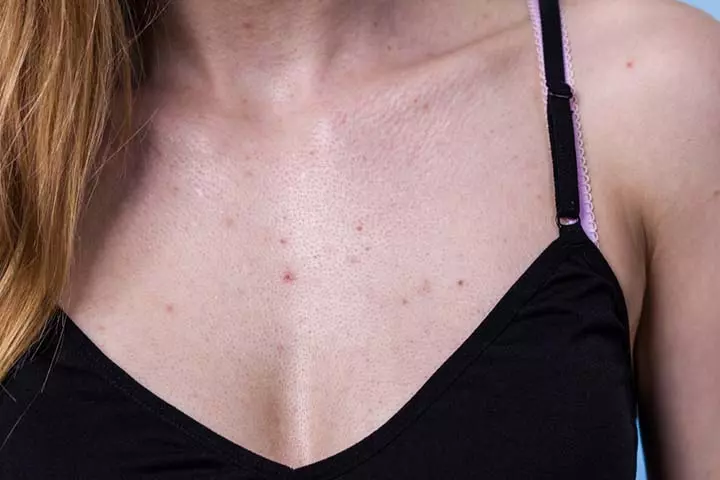
Therefore, it is natural that women resort to cosmetics and beauty products, to mask these skin changes in pregnancy to look beautiful and feel better. Even otherwise, wearing makeup during pregnancy is a usual routine for most women.
 Point to consider
Point to considerCosmetics And Chemicals In Pregnancy
There are contradictory theories on the use of cosmetics and chemical exposure during pregnancy.
Theory 1:
Hydroquinone, a popular skin-lightening agent, does not cause any fetal malformation. However, as it has a relatively high systemic absorption rate into the blood, it is best to minimize exposure to this chemical during pregnancy (3).
Theory 2:
Though the amount of absorption of Tretinoin is low, its topical use may lead to birth defects as per a few medical reports
. (2) Phthalates, a chemical found in most makeup products like lipstick, hairspray, and nail polish, interfere with hormones during pregnancy. A study indicates, a prenatal exposure to the chemical can lower the IQ level of the child by more than six points. (3) Babies of mothers exposed to high levels of phthalates during pregnancy had up to 78 percent higher risk of developing asthma by the age of 11 in comparison to other children (4).

Theory 3:
Topical application of clindamycin and erythromycin for acne does not have any teratogeniciAbility of certain toxic substances to cause congenital abnormalities in the developing fetus effect on the fetus. The skin poorly absorbs salicylic acid, a key ingredient in anti-acne products, and Dihydroxyacetone, a color additive in self-tanning products. Therefore, these two chemicals do not pose any threat to the unborn baby. Sodium, calcium, and potassium hydroxide in depilatory creams too are harmless while expecting. In fact, sunscreens protect the skin from harmful UV rays and help prevent pregnancy melasma. Hence, a majority of people feel that women can look their best by using cosmetics without compromising the health of the unborn child (5).
Risk Factor
Can pregnant women wear makeup? Well, most cosmetics in the markets are not subject to any regulation. So the toxicity of the chemicals in cosmetics or the safety of their use while expecting is still ambiguous.

Cosmetic Ingredients To Avoid During Pregnancy
For your safety in pregnancy, watch out for these ingredients in any of your skin care or cosmetic products and stay away from them. You can consult your dermatologist to suggest specific alternatives for each of them.
Vitamin A: An oral intake of sufficient amounts of vitamin A can work wonders for your skin. Creams and pills that contain retinoids, a synthetic form of vitamin A, help fight acne and psoriasisiA skin condition characterized by thick, scaly patches, dryness, and itchiness and treat skin disorders, premature aging, and warts. However, the use of retinoids during pregnancy can adversely affect fetal development.
Vitamin K: Vitamin K, is one of the major ingredients in any skin lightening cream. It also aids the clotting of blood. During pregnancy, you are prone to developing clots. Hence, it is advisable to not let the vitamin K in cosmetic products penetrate the skin and reach the bloodstream and cause fetal complications.

Centella Asiatica: It is an effective treatment for stretch marks, which, according to the National Health Service (NHS), are known to affect around eight out of every ten pregnant women. However, Centella AsiaticaiA medicinal plant used to treat certain health conditions, including skin ailments increases sensitivity to the sun rays and can cause a rash in pregnant women. Its oral intake has a narcotic-like effect and can even result in miscarriage.
 Be watchful
Be watchfulA Word of Caution
If you love to look glamorous during pregnancy by using cosmetics, please remember the following points:
- Protect your growing fetus by limiting your exposure to chemicals like lead and mercury, especially in the first trimester.
- Nail polish, hair dyes, artificial nails and hair permanents all contain harmful chemicals. Though there are no conclusive evidences on the ill effects of these chemicals on the fetus, it is wise to either completely avoid the use of chemicals during pregnancy or use it in well-ventilated rooms.
 Quick tip
Quick tip
Frequently Asked Questions
1. What makeup should I avoid when pregnant?
Avoid mineral makeup during pregnancy as it contains traces of heavy metals. Apart from this, you should also avoid other makeup products containing chemicals, such as parabens, phthalates, or triclosan, which would adversely affect your baby’s development (6) (7).
2. What should I look for while buying makeup products during pregnancy?
If you are buying makeup products during pregnancy (6) (7)
- Make sure you read the labels carefully
- Do not believe in natural beauty products as they may contain chemicals
- Research well as some natural and organic products also hinder the endocrine functions
- Choose products that contain minimum chemicals
- If you are not sure about the products, use apps to determine their safety
3. What are some common skin issues during pregnancy and how can makeup be used to address them?
Acne, stretch marks, dark circles, and hyperpigmentation are some common skin issues that pregnant women face (9). Light makeup free of harsh chemicals and parabens can cover skin imperfections. For example, if you are experiencing acne, use non-comedogenic and oil-free makeup. Use brightening makeup products if you have hyperpigmentation. Those with sensitive skin should look for fragrance-free makeup. Apart from covering skin issues with makeup, ensure that you follow a good skincare routine and pregnancy beauty tips. Take the help of a dermatologist if you want to learn more about using makeup during pregnancy.
4. What are some natural and organic makeup alternatives for pregnant women?
Gentle, natural, or organic alternatives to makeup should be a part of your pregnancy-safe skincare. Many lip and eye makeup products are from plant waxes and natural oils. You can use them after checking for potential allergens in their ingredient list. Prioritize good skincare as that will influence your appearance the most. Use chamomile, jojoba oil, aloe vera, and rosehip oil to care for your skin. They are rich in antioxidants and fatty acids and are highly beneficial for your skin.
5. How can pregnant women incorporate sunscreen into their makeup routine to protect against UV rays?
Pregnant women should choose a sunscreen that protects against UVA and UVB rays. These are known as broad-spectrum sunscreens. Look out for water-resistant ones with a high SPF. The one you choose should have an SPF of at least 30, as it blocks 97% of the sun’s rays. Currently, FDA has not updated the requirements for specific ingredients that should be a part of sunscreen. Apply sunscreen to all parts of your body that are exposed to sunlight.
Pregnancy entails a lot of hormonal changes in the body throughout the nine months, and that eventually affects your skin as well. Therefore, use natural make-up products and follow a healthy, balanced diet to maintain your radiance during and even after your pregnancy. While using make-up during pregnancy, it is advised that you check the ingredients used in the products. Also, avoid using products that might contain potentially harmful ingredients such as vitamin A and Centella Asiatica as they contain harmful chemicals that might harm the baby or increase the risks of miscarriage.
Infographic: Cosmetic Ingredients To Avoid During Pregnancy
Everyone uses personal care and cosmetic products. However, when used during pregnancy, additional care must be taken because some ingredients could be potentially harmful to the mother and the developing baby. To learn more about these substances, have a look at this infographic. Illustration: Momjunction Design Team
Illustration: Is It Safe To Wear Makeup During Pregnancy?
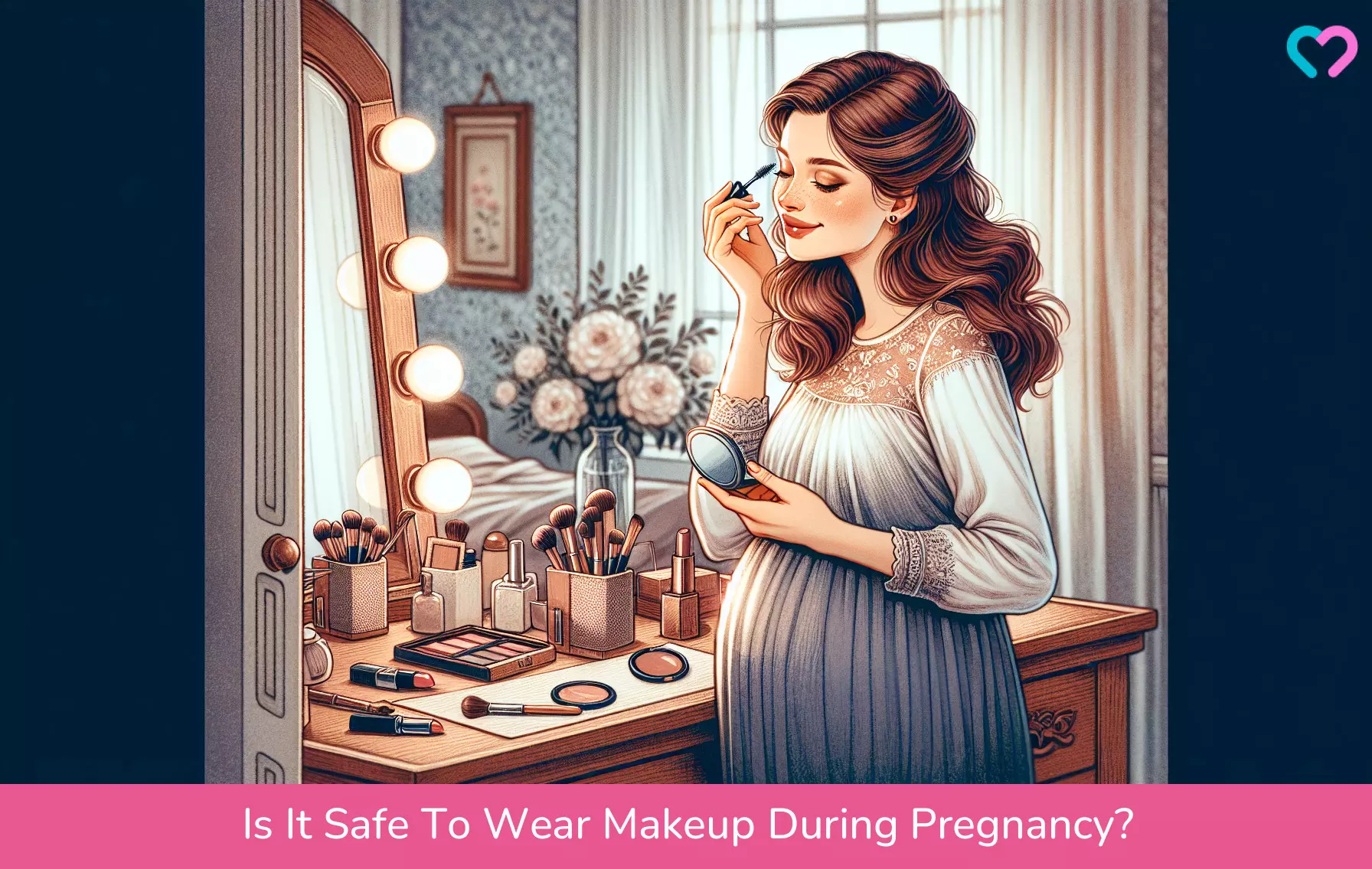
Image: Dall·E/MomJunction Design Team
Are you curious about the safety of skincare routines and makeup products during pregnancy? Watch this video to learn more about the ingredients in products that are safe for your skin and your baby.
Personal Experience: Source
MomJunction articles include first-hand experiences to provide you with better insights through real-life narratives. Here are the sources of personal accounts referenced in this article.
ⅰ. On Pregnancy, Priorities, and Planning What’s Next.https://vibrantbeautyblog.blogspot.com/2018/03/on-pregnancy-priorities-and-planning.html
References
- Exposure to common household chemicals may cause IQ drop.
https://edition.cnn.com/2014/12/11/health/chemical-link-to-lower-iq/ - Safety of skin care products during pregnancy.
https://www.cfp.ca/content/57/6/665.full - Is wearing make-up harmful during pregnancy? Exposure to beauty chemicals is linked with lower IQ in children study claims.
https://europepmc.org/article/pmc/pmc8884185 https://europepmc.org/article/pmc/pmc8884185 - Phthalates Heighten Risk for Childhood Asthma.
https://www.publichealth.columbia.edu/news/phthalates-heighten-risk-childhood-asthma - Pina Bozzo et al; Safety of skin care products during pregnancy.
https://www.ncbi.nlm.nih.gov/pmc/articles/PMC3114665/ - Pregnant Women
https://www.safecosmetics.org/population/pregnant-women/ - Chemicals to Avoid When You’re Pregnant or Breastfeeding.
https://www.nrdc.org/stories/chemicals-avoid-when-youre-pregnant-or-breastfeeding - Safe Use Of Cosmetics And Personal Care Products During Pregnancy.
https://www.ifwip.org/pregnancy-cosmetics/ - Skin changes during pregnancy
https://americanpregnancy.org/healthy-pregnancy/pregnancy-health-wellness/skin-changes/
Community Experiences
Join the conversation and become a part of our nurturing community! Share your stories, experiences, and insights to connect with fellow parents.
Read full bio of Dr. Neha Singh
Read full bio of Ria Saha
Read full bio of Rebecca Malachi
Read full bio of Dr. Joyani Das







